When Mercury became associated with the Dutch record company Philips in late 1961, the Fontana label was established for international releases, leaving Smash the primary outlet for country music, with some rock and roll recordings, r&b, jazz, and miscellaneous genres such as instrumental dance music, comedy, and soundtracks. But with Shelby Singleton in charge, the label had a definite lean toward country music, and in fact turned out to be Mercury's primary country music label. Even the rock and roll artists who had hits early on, for the most part ended up as country artists!
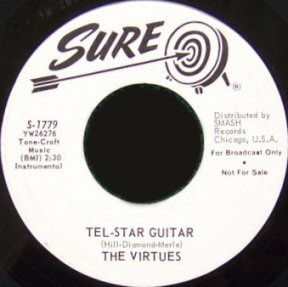 In keeping with the sense that Smash initially was Mercury's "miscellaneous" label, the Smash S-1700
singles series was also used for Mercury's contract custom pressing for other labels. The early 1700
series was a mixture of labels: any time some other label wanted Mercury to press their records, the
singles came out in the 1700 series. In fact, the first single pressed in the 1700 series was the
Mus-Twangs instrumentals "Loch Lommond"/"Marie" [Nero S-1700, recorded March 14, 1961]. Before
mid-1963, the 1700 series was fairly littered with pressings for labels other than Smash, including
Ensign, Sure, Rich, Ramco, Fontana, EM, USA, Pioneer, Angie, Dante, and Hallway. After that time, the
only other label pressed in the 1700 series was Fontana, and that stopped about February, 1964.
In keeping with the sense that Smash initially was Mercury's "miscellaneous" label, the Smash S-1700
singles series was also used for Mercury's contract custom pressing for other labels. The early 1700
series was a mixture of labels: any time some other label wanted Mercury to press their records, the
singles came out in the 1700 series. In fact, the first single pressed in the 1700 series was the
Mus-Twangs instrumentals "Loch Lommond"/"Marie" [Nero S-1700, recorded March 14, 1961]. Before
mid-1963, the 1700 series was fairly littered with pressings for labels other than Smash, including
Ensign, Sure, Rich, Ramco, Fontana, EM, USA, Pioneer, Angie, Dante, and Hallway. After that time, the
only other label pressed in the 1700 series was Fontana, and that stopped about February, 1964.
The first actual Smash single was S-1701, "That's the Way We Love"/"Prison Break" by the Paramours, who recorded five songs for Smash in a session in February or March, 1961. Two others, "Cutie Cutie" and "Miss Social Climber" were issued as Smash 1718, with a cover of "Long Tall Sally" remaining unissued. This was a band that included Bill Medley, who was later half of the Righteous Brothers. The next year, a new version of the Paramours also included Bobby Hatfield, who met Medley in 1962 while in his own band, the Vibrations. By the time the new Paramours got around to recording for the Moonglow label in late 1962, the band was down to just the two singers, who changed their name to the Righteous Brothers after just one single. Although providing a footnote in history, the Paramours on Smash were commercially unsuccessful. "That's The Way We Love" sold a few copies in hometown Chicago, reaching #37 on the WLS charts and #34 on WJJD's charts, but lasted only a few weeks in April and May before fading out.
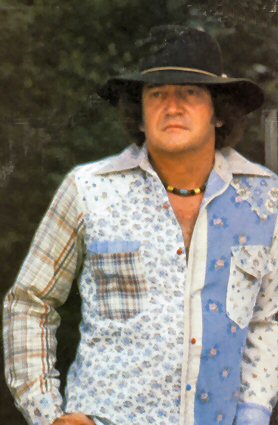 It
was the second Smash single that got them on the map. A 21-year-old Louisiana native, Joe Barry
(nee Barrios), had teamed up with Huey Meaux and recorded an old Les Paul and Mary Ford pop
record in a style that could only be called a clone of Fats Domino's, and probably backed by some of the
same musicians. "I'm a Fool to Care" was first released on a local label [JIN 144], and when it hit locally
was acquired by Mercury and reissued as Smash 1702. It is safe to say that many of the radio listeners
thought it was Fats Domino, and the record cruised to #24 nationally. Barry followed his
hit with another old tune, this time a 1940s country hit by the Sons of the Pioneers, "Teardrops in My
Heart" [Smash 1710], which reached #63. The third single was a 1950 Ernest Tubb country song, "You
Don't Have to Be a Baby to Cry" [Smash 1727], but this time, it didn't chart. Two more singles followed,
with no success. Smash did not feel it necessary to issue an album by Barry, even though they had
enough songs for one. All of these had been recorded by JIN, and most likely were recorded in mono
only. In 1977, Barry issued an album on ABC-Dot, this time in stereo, with the same sort of formula of
old songs in the Cajun style (although he did not remake his old Smash tunes).
It
was the second Smash single that got them on the map. A 21-year-old Louisiana native, Joe Barry
(nee Barrios), had teamed up with Huey Meaux and recorded an old Les Paul and Mary Ford pop
record in a style that could only be called a clone of Fats Domino's, and probably backed by some of the
same musicians. "I'm a Fool to Care" was first released on a local label [JIN 144], and when it hit locally
was acquired by Mercury and reissued as Smash 1702. It is safe to say that many of the radio listeners
thought it was Fats Domino, and the record cruised to #24 nationally. Barry followed his
hit with another old tune, this time a 1940s country hit by the Sons of the Pioneers, "Teardrops in My
Heart" [Smash 1710], which reached #63. The third single was a 1950 Ernest Tubb country song, "You
Don't Have to Be a Baby to Cry" [Smash 1727], but this time, it didn't chart. Two more singles followed,
with no success. Smash did not feel it necessary to issue an album by Barry, even though they had
enough songs for one. All of these had been recorded by JIN, and most likely were recorded in mono
only. In 1977, Barry issued an album on ABC-Dot, this time in stereo, with the same sort of formula of
old songs in the Cajun style (although he did not remake his old Smash tunes).
A few months and several singles after Joe Barry hit with "I'm a Fool to Care," Smash got another record from a label in the south, and had its second chart hit. Rick and the Keens were a fivesome from Wichita Falls, Texas, who had done a remake of the 1957 record of "Peanuts" by Little Joe and the Thrillers. It was a rock and roll version of the R&B original, complete with soaring falsetto. It was first issued locally on Austin 303, then on the regional LeCam label [LeCam 721] before Smash obtained the master and reissued it as Smash 1705. It reached #60 on the national pop charts, but the followup, "Maybe"/"Popcorn" [Smash 1722] sank without a trace.
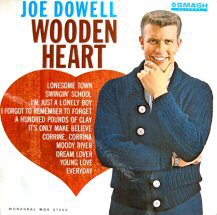 In the summer of 1961, about the same time that "Peanuts" was slowly making its way up the charts,
Smash released another record that wasted no time in going to #1: "Wooden Heart" by Joe Dowell
[Smash 1706]. The song had come from an Elvis Presley movie in 1960, and Dowell had a passable
Elvis-like voice, not to mention his clean-cut good looks. Dowell's version easily outdistanced a
competing version by ex-Dell Vikings singer Gus Backus [Fono-Graf 1234]. Although the song had
some German lyrics, neither Dowell (who was born in Indiana) nor Backus (New York) were anything but
American. Dowell's followup single, "The Bridge of Love" [Smash 1717] only reached #50, followed by
"A Kiss for Christmas" in December [Smash 1728, #110]. After a chart miss in early 1962, he came
back with a #23 hit in the summer of 1962 with "Little Red Rented Rowboat" [Smash 1759]. A couple of
unsuccessful singles followed, and that was that. Dowell had the honor of having Smash's first album
release, although it didn't dent the charts.
In the summer of 1961, about the same time that "Peanuts" was slowly making its way up the charts,
Smash released another record that wasted no time in going to #1: "Wooden Heart" by Joe Dowell
[Smash 1706]. The song had come from an Elvis Presley movie in 1960, and Dowell had a passable
Elvis-like voice, not to mention his clean-cut good looks. Dowell's version easily outdistanced a
competing version by ex-Dell Vikings singer Gus Backus [Fono-Graf 1234]. Although the song had
some German lyrics, neither Dowell (who was born in Indiana) nor Backus (New York) were anything but
American. Dowell's followup single, "The Bridge of Love" [Smash 1717] only reached #50, followed by
"A Kiss for Christmas" in December [Smash 1728, #110]. After a chart miss in early 1962, he came
back with a #23 hit in the summer of 1962 with "Little Red Rented Rowboat" [Smash 1759]. A couple of
unsuccessful singles followed, and that was that. Dowell had the honor of having Smash's first album
release, although it didn't dent the charts.
That summed up Smash's chart activity for 1961, their first year of operation. In addition to those singles mentioned, singles were issued by the Hayden Sisters, Kitty Ford, Danny Jordan, the Cadillacs, Billy Deaton, the Spirals, the Viceroys, Howard Crockett, the Bachelors, Little Ellen, and Bonnie Charles. More interestingly, a single was issued by the Corsairs, who would later have hits for Chicago's Tuff label; a single by Chad Allen, who would later found the successful Canadian rock group the Guess Who, and singer Cathy Carr, who had earlier chart records for Roulette.
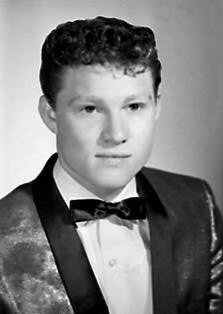 Smash's new year, 1962, started with another #1 record: "Hey! Baby" by Bruce Channel (pronounced
"Cha-NELL"), with Delbert McClinton on harmonica. It was another of Shelby Singleton's finds from the
Texas-Louisiana area. Channel was a Texas native who had recorded the song in December, 1961, for
the LeCam label, and Singleton obtained the master from LeCam and reissued it as Smash 1731. When
the song hit, Smash arranged for a recording session for an album, which took place in early 1962. The
album [Hey! Baby, Smash 2/67008] became Smash's first album to chart, reaching #114 in the
spring. Channel's followup records followed a common pattern. "Number One Man" [Smash 1752] only
reached #52 in late spring, followed by "Come on Baby" [Smash 1769], which reached #98 in the
summer, followed by "Somewhere in This Town" [Smash 1780], which made #117 in the fall. Smash
tried three more unsuccessful singles, then released him. But rather than give up, like many artists who
see their popularity wane, Channel persisted. By early 1964, he was back with LeCam, where he had
another chart record with "Going Back to Louisiana" [LeCam 122, #89], with no successful followup. He
pressed on, and in 1967 was back on the top-100 with a Dale Hawkins produced tune, "Mr. Bus Driver"
[Mala 579, #90]. Channel continued performing until 1973. About five years later, he moved to
Nashville, where he applied his skill as a songwriter to pen hits for country acts like Mel McDaniel,
Alabama, John Conlee, T,G. Shepherd, and Janie Fricke.
Smash's new year, 1962, started with another #1 record: "Hey! Baby" by Bruce Channel (pronounced
"Cha-NELL"), with Delbert McClinton on harmonica. It was another of Shelby Singleton's finds from the
Texas-Louisiana area. Channel was a Texas native who had recorded the song in December, 1961, for
the LeCam label, and Singleton obtained the master from LeCam and reissued it as Smash 1731. When
the song hit, Smash arranged for a recording session for an album, which took place in early 1962. The
album [Hey! Baby, Smash 2/67008] became Smash's first album to chart, reaching #114 in the
spring. Channel's followup records followed a common pattern. "Number One Man" [Smash 1752] only
reached #52 in late spring, followed by "Come on Baby" [Smash 1769], which reached #98 in the
summer, followed by "Somewhere in This Town" [Smash 1780], which made #117 in the fall. Smash
tried three more unsuccessful singles, then released him. But rather than give up, like many artists who
see their popularity wane, Channel persisted. By early 1964, he was back with LeCam, where he had
another chart record with "Going Back to Louisiana" [LeCam 122, #89], with no successful followup. He
pressed on, and in 1967 was back on the top-100 with a Dale Hawkins produced tune, "Mr. Bus Driver"
[Mala 579, #90]. Channel continued performing until 1973. About five years later, he moved to
Nashville, where he applied his skill as a songwriter to pen hits for country acts like Mel McDaniel,
Alabama, John Conlee, T,G. Shepherd, and Janie Fricke.
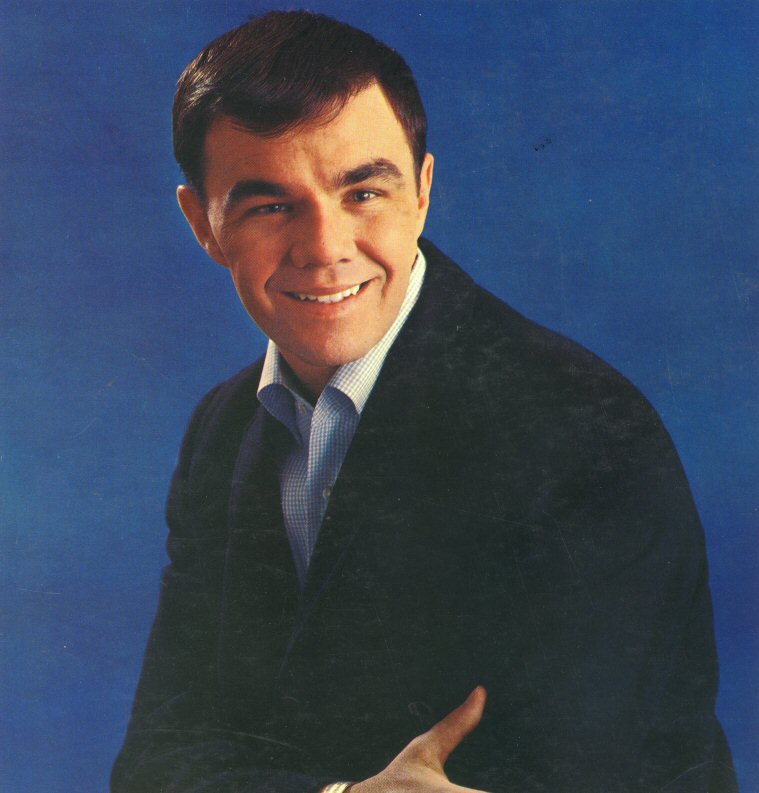 Channel's chart records, and Joe Dowell's "Little Red Rented Rowboat," were the only successes for
Smash in 1962 before mid-summer, when they had another huge hit. Dickey Lee (Royden Dickey
Lipscombe) was a Memphis-born, Texas-based singer/songwriter who had earlier recorded for Sun by
the time he was signed to Smash. He recorded the maudlin tragedy "Patches" at the Bradley Recording
Studio in Nashville on March 7, 1962, with studio musicians and the Stephen Scott Singers. When
issued on Smash 1758, it quickly rose to #6 and became a classic of the tragedy song genre. An
album
[Patches, Smash 2/67020] was quickly recorded, again at Bradley's, and rose to #50 on the
charts. The followup single, "I Saw Linda Yesterday" [Smash 1791], which came out near the end of
1962, was another hit, reaching #14. His third single, "Don't Wanna Think About Paula" [Smash 1808],
released the next spring, continued his songs about the women in his life, but didn't do nearly as well,
peaking at #68. The next few singles missed the top 100, although "The Day the Sawmill Closed Down"
[Smash 1844] scored in certain markets, such as Chicago, where it made #19. Lee left Smash in 1964
to sign with Twentieth Century Fox (TCF-Hall), where he notched another tragedy classic with "Laurie
(Strange Things Happen)" [TCF-Hall 102]. A second Smash album, I Saw Linda Yesterday
[Smash 2/67062], a collection of his various singles after "Patches," was reportedly issued in 1965 after
he left the label, but we have never seen a copy. By 1971, Lee had signed with RCA and turned to
country music, where he had dozens of country chart records well into the 1980s.
Channel's chart records, and Joe Dowell's "Little Red Rented Rowboat," were the only successes for
Smash in 1962 before mid-summer, when they had another huge hit. Dickey Lee (Royden Dickey
Lipscombe) was a Memphis-born, Texas-based singer/songwriter who had earlier recorded for Sun by
the time he was signed to Smash. He recorded the maudlin tragedy "Patches" at the Bradley Recording
Studio in Nashville on March 7, 1962, with studio musicians and the Stephen Scott Singers. When
issued on Smash 1758, it quickly rose to #6 and became a classic of the tragedy song genre. An
album
[Patches, Smash 2/67020] was quickly recorded, again at Bradley's, and rose to #50 on the
charts. The followup single, "I Saw Linda Yesterday" [Smash 1791], which came out near the end of
1962, was another hit, reaching #14. His third single, "Don't Wanna Think About Paula" [Smash 1808],
released the next spring, continued his songs about the women in his life, but didn't do nearly as well,
peaking at #68. The next few singles missed the top 100, although "The Day the Sawmill Closed Down"
[Smash 1844] scored in certain markets, such as Chicago, where it made #19. Lee left Smash in 1964
to sign with Twentieth Century Fox (TCF-Hall), where he notched another tragedy classic with "Laurie
(Strange Things Happen)" [TCF-Hall 102]. A second Smash album, I Saw Linda Yesterday
[Smash 2/67062], a collection of his various singles after "Patches," was reportedly issued in 1965 after
he left the label, but we have never seen a copy. By 1971, Lee had signed with RCA and turned to
country music, where he had dozens of country chart records well into the 1980s.
Other Smash artists of note in 1962 (though not successful on the charts) were Lee Hazelwood, Bobby Hebb, Nini Rosso, Buddy Lucas, Johnny Bond, Pee Wee Crayton, Don Helms, Richard Berry, and Ray Smith. The Echoes, who had earlier scored a hit with "Baby Blue" [Seg-Way 103], released a remake of Ersel Hickey's "Bluebirds Over the Mountain" [Smash 1766] in September which missed the national charts but reached #15 in Chicago, the home of Mercury/Smash.
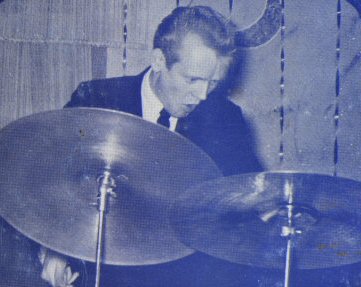 By May of 1963, not much was happening on the charts for Smash; Dickey Lee's third single in March
had been a disappointment but had been the only new chart record for the label for over five months. A
Bill Justis single, "Tamouré" [Smash 1812] had gone top-10 in Chicago in May, reaching #7, but
oddly missed the national market when it topped out at #101. Looking for some more talent from small
labels in the South, Singleton obtained some masters from the Renay label featuring drummer/vocalist
Matt Lucas. Memphis-born Lucas, like Dickey Lee and Bill Justis, had worked at Sun Records, but had
not released any records there. His 1963 remake of Hank Snow's "I'm Movin' On" [Renay 303, reissued
as Smash 1813] was a high energy, innovative reworking that rose to #56 nationally in the early
summer. Smash only got four Matt Lucas songs from the Renay label, and when the followup single,
"Ooby Dooby"/"No One Like You" [Smash 1860] went nowhere, Smash promptly forgot about him.
Lucas "moved on" to Dot Records, where he recorded a couple of singles in the same vein in 1964,
including a rocking remake of Chuck Berry's "Maybellene," but never had another hit. In 1979, he put
out an album on the Blue Jam label out of Florida, which included his first Smash single along with two
Dot singles, backed with a side of new material.
By May of 1963, not much was happening on the charts for Smash; Dickey Lee's third single in March
had been a disappointment but had been the only new chart record for the label for over five months. A
Bill Justis single, "Tamouré" [Smash 1812] had gone top-10 in Chicago in May, reaching #7, but
oddly missed the national market when it topped out at #101. Looking for some more talent from small
labels in the South, Singleton obtained some masters from the Renay label featuring drummer/vocalist
Matt Lucas. Memphis-born Lucas, like Dickey Lee and Bill Justis, had worked at Sun Records, but had
not released any records there. His 1963 remake of Hank Snow's "I'm Movin' On" [Renay 303, reissued
as Smash 1813] was a high energy, innovative reworking that rose to #56 nationally in the early
summer. Smash only got four Matt Lucas songs from the Renay label, and when the followup single,
"Ooby Dooby"/"No One Like You" [Smash 1860] went nowhere, Smash promptly forgot about him.
Lucas "moved on" to Dot Records, where he recorded a couple of singles in the same vein in 1964,
including a rocking remake of Chuck Berry's "Maybellene," but never had another hit. In 1979, he put
out an album on the Blue Jam label out of Florida, which included his first Smash single along with two
Dot singles, backed with a side of new material.
 In August, Johnny Caswell's "At the Shore" [Smash 1833] inched up to #97 then died. Caswell would
later front the band Crystal Mansion. About the same time, though, Smash had another blockbuster on
their hands. The Angels, who had had a couple of chart records on the Caprice label earlier, went
quickly to #1 with "My Boyfriend's Back" [Smash 1834], one of the new genre of "girl group" records that
was becoming very popular. Over the years, the Angels personnel changed somewhat. This
incarnation, the most successful, included lead singer Peggy Santiglia with sisters Barbara Allbut and
Phyllis "Jiggs" Allbut. The followup single [Smash 1854] proved to be a two-sided hit: "I Adore Him"
making #25 and "Thank You and Goodnight" making #84 in the fall. A third single, "Wow Wow Wee
(He's the Boy For Me)" [Smash 1870, #41] closed out their chart career in early 1964. Smash released
two albums by the group. Their first, My Boyfriend's Back [Smash 2/60739] sold reasonably well,
reaching #33, but the second, A Halo to You [Smash 2/60748], failed to chart. The group also
made a number of recordings as background vocalists in the 1960s.
In August, Johnny Caswell's "At the Shore" [Smash 1833] inched up to #97 then died. Caswell would
later front the band Crystal Mansion. About the same time, though, Smash had another blockbuster on
their hands. The Angels, who had had a couple of chart records on the Caprice label earlier, went
quickly to #1 with "My Boyfriend's Back" [Smash 1834], one of the new genre of "girl group" records that
was becoming very popular. Over the years, the Angels personnel changed somewhat. This
incarnation, the most successful, included lead singer Peggy Santiglia with sisters Barbara Allbut and
Phyllis "Jiggs" Allbut. The followup single [Smash 1854] proved to be a two-sided hit: "I Adore Him"
making #25 and "Thank You and Goodnight" making #84 in the fall. A third single, "Wow Wow Wee
(He's the Boy For Me)" [Smash 1870, #41] closed out their chart career in early 1964. Smash released
two albums by the group. Their first, My Boyfriend's Back [Smash 2/60739] sold reasonably well,
reaching #33, but the second, A Halo to You [Smash 2/60748], failed to chart. The group also
made a number of recordings as background vocalists in the 1960s.
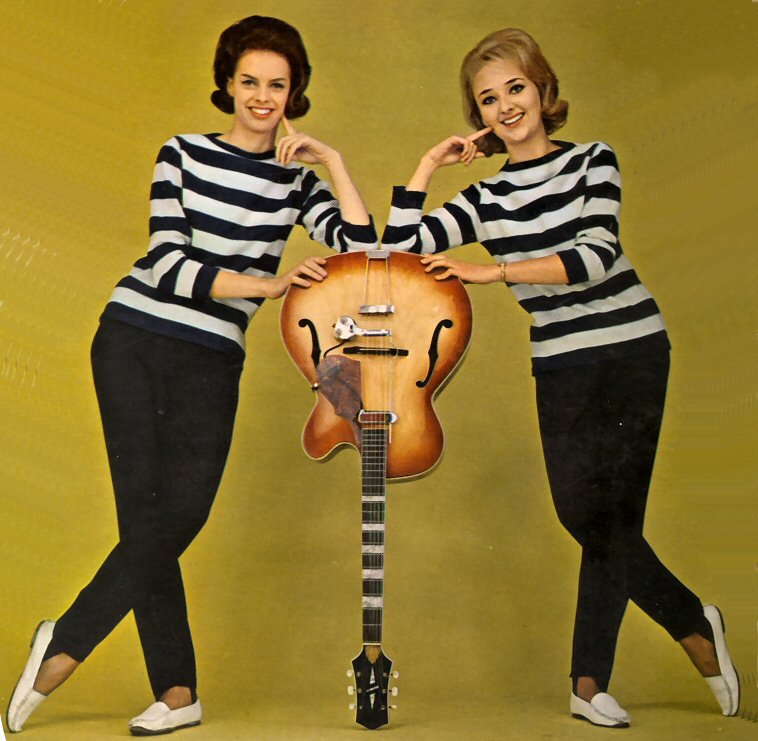 Near the end of 1963, Smash succeeded with another "girl group" of sorts, the Caravelles, who were two
office workers from London who fancied themselves another Patience and Prudence. Nineteen-year-old
steno/typist Lois Wilkinson, who sang and played guitar, teamed up with seventeen year old accounting
machine operator Andrea Simpson to sing the old Ernest Tubb (later Dean Martin) song, "You Don't
Have to Be a Baby to Cry" [Smash 1852], which jumped to #3 nationally. Their two followup singles
didn't even come close to this success. The first of the two, "Have You Ever Been Lonely" [Smash 1869]
only reached #94, followed by "How Can I Be Sure"/"You Are Here" [Smash 1901], which flopped
completely. Their one album, You Don't Have to Be a Baby to Cry [Smash 2/67044] reached
#127, and of course featured remakes of both Paitience and Prudence's top-20 hits, "Tonight You
Belong to Me" and "Gonna Get Along Without You Now." A pleasant sounding duet, but apparently their
hit was a bit of nostalgia just before the British Invasion changed everything. Ironically, this British duo
got no benefit from the British Invasion.
Near the end of 1963, Smash succeeded with another "girl group" of sorts, the Caravelles, who were two
office workers from London who fancied themselves another Patience and Prudence. Nineteen-year-old
steno/typist Lois Wilkinson, who sang and played guitar, teamed up with seventeen year old accounting
machine operator Andrea Simpson to sing the old Ernest Tubb (later Dean Martin) song, "You Don't
Have to Be a Baby to Cry" [Smash 1852], which jumped to #3 nationally. Their two followup singles
didn't even come close to this success. The first of the two, "Have You Ever Been Lonely" [Smash 1869]
only reached #94, followed by "How Can I Be Sure"/"You Are Here" [Smash 1901], which flopped
completely. Their one album, You Don't Have to Be a Baby to Cry [Smash 2/67044] reached
#127, and of course featured remakes of both Paitience and Prudence's top-20 hits, "Tonight You
Belong to Me" and "Gonna Get Along Without You Now." A pleasant sounding duet, but apparently their
hit was a bit of nostalgia just before the British Invasion changed everything. Ironically, this British duo
got no benefit from the British Invasion.
Other new Smash single artists during 1963 included Miss Toni Fisher, Jody Reynolds, Ivory Joe Hunter, Kenny Dino, Lee Dorsey, and the Four-Evers.
By 1964, Smash had signed yet another ex-Sun Records artist, Jerry Lee Lewis, and was starting to consolidate into a country music label. Later in the year, Roger Miller joined the label and in 1965, Charlie Rich (another ex-Sun records artist), was added.
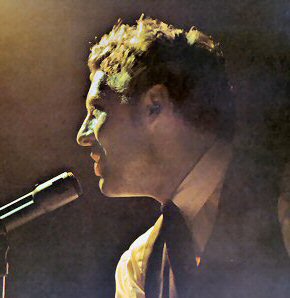 Jerry Lee Lewis' Sun recordings remain today as classics. Jerry, however, had got himself a pile of bad
publicity during his time at Sun, mostly for his lifestyle outside the studio, and by 1963 Sun wasn't
releasing his latest recordings. His career had been going down the tubes, as he hadn't had a chart hit
since 1961. A change of scene to Shelby Singleton's Smash label couldn't hurt. It turned out to be one of
the best things that ever happened to his career. Lewis went to Sam Phillips Studio in Nashville in
September 22-24, 1963, under the direction of Shelby Singleton with Billy Sherrill recording, and laid
down a couple of dozen songs, remaking his classic Sun hits as well as recording some new songs to
release as singles. The first of these new singles was "Pen and Paper" [Smash 1857] which made #36
on the country charts in early 1964. About the same time, Smash issued an album from these sessions
called The Golden Hits of Jerry Lee Lewis [Smash 2/67040], which reached #116 on the charts.
All the classic Sun hits were there, in new versions that would haunt oldies stations for years afterward,
as the new versions, to more than the most casual listener, were noticeably different from the Sun
originals.
Jerry Lee Lewis' Sun recordings remain today as classics. Jerry, however, had got himself a pile of bad
publicity during his time at Sun, mostly for his lifestyle outside the studio, and by 1963 Sun wasn't
releasing his latest recordings. His career had been going down the tubes, as he hadn't had a chart hit
since 1961. A change of scene to Shelby Singleton's Smash label couldn't hurt. It turned out to be one of
the best things that ever happened to his career. Lewis went to Sam Phillips Studio in Nashville in
September 22-24, 1963, under the direction of Shelby Singleton with Billy Sherrill recording, and laid
down a couple of dozen songs, remaking his classic Sun hits as well as recording some new songs to
release as singles. The first of these new singles was "Pen and Paper" [Smash 1857] which made #36
on the country charts in early 1964. About the same time, Smash issued an album from these sessions
called The Golden Hits of Jerry Lee Lewis [Smash 2/67040], which reached #116 on the charts.
All the classic Sun hits were there, in new versions that would haunt oldies stations for years afterward,
as the new versions, to more than the most casual listener, were noticeably different from the Sun
originals.
From that starting point, Jerry Lee released a series of rock and roll/rockabilly albums, many of them live. In 1968, he decided to go straight country, with Another Place, Another Time, a weepy-boozer album (i.e., totally in line with country music at the time) and his career revived big time. From there, he rolled up well over 50 more country chart hits, most of them with Smash and later Mercury. His country top-10 records for Smash included: "Another Place, Another Time" [Smash 2146, #4], "What's Made Milwaukee Famous (Has Made a Loser Out of Me)" [Smash 2164, #2], "She Still Comes Around (To What's Left of Me)" [Smash 2186, #2], "To Make Love Sweeter for You" [Smash 2202, #1], "Don't Let Me Cross Over," a duet with his sister Linda Gail Lewis [Smash 2220, #9], "One Has My Name (The Other Has My Heart)" [Smash 2224, #3], "She Even Woke Me Up to Say Goodbye" [Smash 2244, #2], and "Once More with Feeling" [Smash 2257, #2]. At one point in 1969, he was so hot that Sun Records started putting out the material he had recorded for them just before the September, 1963, session for Shelby Singleton, and they sold, too! "Invitation to Your Party," "One Minute Past Eternity," and "I Can't Seem to Say Goodbye," all recorded for Sun in late August, 1963, just a few weeks before the Smash recording session, all made top 10 for the revamped Sun Records in 1969 and 1970. By that time Sun was owned, ironically, by Shelby Singleton, who apparently knew a good song when he heard one.
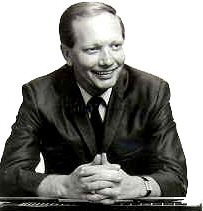 In March, 1964, Smash had another country artist hit the pop charts when Roddis Franklin "Pete"
Drake's novelty remake of the Little Dippers' "Forever" [Smash 1867] reached #25. Drake was a veteran
steel guitarist, and in an innovative move that anticipated Peter Frampton by more than a decade, found
a way to incorporate his voice into the steel guitar sounds, billing himself as "Pete Drake and His Talking
Steel Guitar." His followup single, a reworking of Brenda Lee's "I'm Sorry" [Smash 1910], backed by Bill
Justis' Orchestra, only managed to make #122 nationally, but once again, in hometown Chicago Smash
managed to push the record to #26. After this brief fling with fame as a front-line artist, Drake returned to
his work in Nashville as a legendary session steel guitarist, playing on many, many other artists' hits.
In March, 1964, Smash had another country artist hit the pop charts when Roddis Franklin "Pete"
Drake's novelty remake of the Little Dippers' "Forever" [Smash 1867] reached #25. Drake was a veteran
steel guitarist, and in an innovative move that anticipated Peter Frampton by more than a decade, found
a way to incorporate his voice into the steel guitar sounds, billing himself as "Pete Drake and His Talking
Steel Guitar." His followup single, a reworking of Brenda Lee's "I'm Sorry" [Smash 1910], backed by Bill
Justis' Orchestra, only managed to make #122 nationally, but once again, in hometown Chicago Smash
managed to push the record to #26. After this brief fling with fame as a front-line artist, Drake returned to
his work in Nashville as a legendary session steel guitarist, playing on many, many other artists' hits.
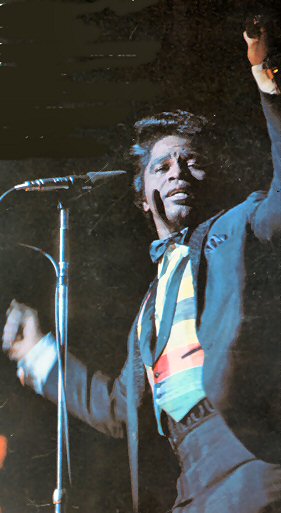 In April, 1964, came the first of a long list of material by James Brown and his band. As early as 1961,
Brown and King owner Syd Nathan had been having disagreements over Brown's King releases
– primarily a control issue – as Brown wanted to release a "live" album and Nathan was
dead set against it. Finally, they reached a compromise: if Brown financed the recording out of his own
pocket, Nathan would release the album. The result was the successful 1962 album Live at the
Apollo, which even today stands as an incredible recording. But the arguments continued, and it had
reached the point that Brown refused to do any new recordings for King. During this period, Nathan
released various songs as King singles that came from recordings prior to 1962. By late 1963, this had
been going on for over a year when James Brown unilaterally announced that his King contract only
covered his vocal recordings as James Brown, and that he was free to record his own instrumentals as
"The James Brown Orchestra" or produce other members of his band. He signed a contract with Smash
to do just that. The first single was "Baby, Baby, Baby" [Smash 1884], pairing Bobby Byrd, the leader of
the Famous Flames, his backing vocal group, with Anna King, another member of his touring band. The
song reached #52 on the pop charts and #15 on the R&B charts. Syd Nathan probably felt that this was
a contract violation, but didn't press it. Next was an instrumental with James Brown at the organ playing
"Caledonia" [Smash 1898], which just barely made the top-40 on the R&B charts, and stiffed on the pop
side (#95). Irritating, as Nathan still felt this was a contract violation, but he bided his time. Solo singles
by Bobby Byrd and Anna King, and another instrumental by James Brown weren't big sellers when
released in the summer of 1964. Then like the teenager who just has to push the envelope to see what
he can get away with, Brown issued a vocal, "Out of Sight" [Smash 1919, credited to "James Brown and
His Orchestra"], which jumped to #24 pop and #5 R&B when issued in August. That was the last straw
for Nathan; James Brown was now openly defying his King contract. Nathan sued, and eventually won
an injunction against Smash releasing vocal records by James Brown. When a Smash album of the
same title [Smash 2/67058] followed in early 1965, legal action forced Smash to withdraw it quickly.
Some sort of settlement followed, with Brown going back to King and recording some of the strongest
singles of his career (starting with "Papa's Got a Brand New Bag"), while Smash was able to retain their
masters and release them. Eventually, the Out of Sight album was reissued in 1968 as Smash
67109.
In April, 1964, came the first of a long list of material by James Brown and his band. As early as 1961,
Brown and King owner Syd Nathan had been having disagreements over Brown's King releases
– primarily a control issue – as Brown wanted to release a "live" album and Nathan was
dead set against it. Finally, they reached a compromise: if Brown financed the recording out of his own
pocket, Nathan would release the album. The result was the successful 1962 album Live at the
Apollo, which even today stands as an incredible recording. But the arguments continued, and it had
reached the point that Brown refused to do any new recordings for King. During this period, Nathan
released various songs as King singles that came from recordings prior to 1962. By late 1963, this had
been going on for over a year when James Brown unilaterally announced that his King contract only
covered his vocal recordings as James Brown, and that he was free to record his own instrumentals as
"The James Brown Orchestra" or produce other members of his band. He signed a contract with Smash
to do just that. The first single was "Baby, Baby, Baby" [Smash 1884], pairing Bobby Byrd, the leader of
the Famous Flames, his backing vocal group, with Anna King, another member of his touring band. The
song reached #52 on the pop charts and #15 on the R&B charts. Syd Nathan probably felt that this was
a contract violation, but didn't press it. Next was an instrumental with James Brown at the organ playing
"Caledonia" [Smash 1898], which just barely made the top-40 on the R&B charts, and stiffed on the pop
side (#95). Irritating, as Nathan still felt this was a contract violation, but he bided his time. Solo singles
by Bobby Byrd and Anna King, and another instrumental by James Brown weren't big sellers when
released in the summer of 1964. Then like the teenager who just has to push the envelope to see what
he can get away with, Brown issued a vocal, "Out of Sight" [Smash 1919, credited to "James Brown and
His Orchestra"], which jumped to #24 pop and #5 R&B when issued in August. That was the last straw
for Nathan; James Brown was now openly defying his King contract. Nathan sued, and eventually won
an injunction against Smash releasing vocal records by James Brown. When a Smash album of the
same title [Smash 2/67058] followed in early 1965, legal action forced Smash to withdraw it quickly.
Some sort of settlement followed, with Brown going back to King and recording some of the strongest
singles of his career (starting with "Papa's Got a Brand New Bag"), while Smash was able to retain their
masters and release them. Eventually, the Out of Sight album was reissued in 1968 as Smash
67109.
James Brown only recorded for Smash for about three years, but made the most of that time, releasing nine different albums from 1964-1968, most of them instrumentals (or vocals by other members of his road show band), and most of them making the album charts. In addition, Anna King had an album Back to Soul [Smash 2/60759], which also contained her hit duet with Bobby Byrd, "Baby Baby Baby." After that duet, Byrd had seven singles released on Smash, but no albums, despite the duet and "We Are In Love" [Smash 1964, #14 R&B, #120 pop] being hits. Brown himself had seven additional Smash singles, including an abortive attempt by Smash to cash in on his King hit of "I Got You (I Feel Good)" [King 6015] by issuing the earlier (and inferior) Smash version as Smash 1989. This was about the same time as the Out of Sight album came out and was withdrawn; the single was withdrawn, also. Other than that, the rest of the singles were instrumentals and were not big sellers (the instrumental version of "Try Me" on Smash 2008 in December, 1965, was the last Smash chart single, making #34 R&B and #63 pop). Brown's last session for Smash was in New York City on April 4-6, 1967, when he recorded the James Brown Plays the Real Thing album [Smash 2/67093].
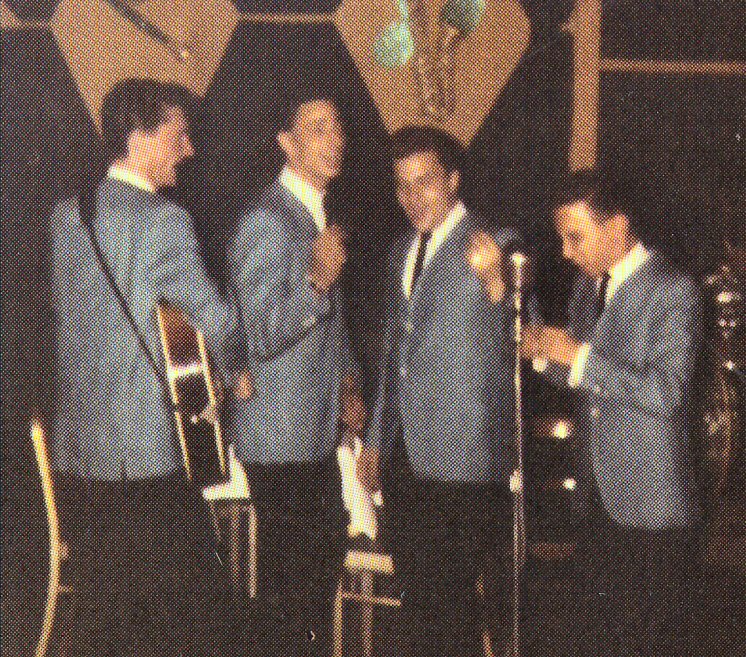 Speaking
of New York City, back around the time James Brown's records started appearing on Smash, a group
from that city called the Four-Evers (sometimes "4-Evers"), a group whose name rings few bells but who
almost everyone has heard without knowing it, also had a minor chart hit. It was "Be My Girl" [Smash
1887], which made #75 pop nationally in May, although it was a much bigger hit in New York City. The
song had an eerie Four-Seasons-like sound, and with good reason. The song was recorded by Bob
Crewe, who likewise recorded and managed the Four Seasons. The musicians were the same ones
used by the Four Seasons (Charlie Callelo's Orchestra), and the instrumental track could have been
right off a Four Seasons album. The song was written by Four Seasons member Bob Gaudio. And
Frankie Valli was reportedly even on the very end of the record helping with some of the high notes.
Their two other Smash singles, which didn't chart, as well as the flip of "Be My Girl," sounded vaguely
like the Seasons, but not enough for anyone to mistake the two groups, and their earlier non-Smash
singles sounded quite different, most with a distinct New York doo-wop flavor. This was no accident,
either. The group had been around since the late 1950s recording for various labels, including Columbia.
After their brief stint with Smash, the group continued recording and doing backing vocals and
advertising jingles. In the late 1960s, they were the backing vocalists for Andy Kim hits on Steed, and
were the backing vocalists for Ron Dante and Toni Wine as "The Archies" on their huge international hit
"Sugar Sugar" [Calendar 1008]. The group went through many personnel changes during their
1957-to-1970 career. The lineup for their hit Smash single was Joe DiBenedetto, John Capriani, Steve
Tudanger, and Nick Zagami.
Speaking
of New York City, back around the time James Brown's records started appearing on Smash, a group
from that city called the Four-Evers (sometimes "4-Evers"), a group whose name rings few bells but who
almost everyone has heard without knowing it, also had a minor chart hit. It was "Be My Girl" [Smash
1887], which made #75 pop nationally in May, although it was a much bigger hit in New York City. The
song had an eerie Four-Seasons-like sound, and with good reason. The song was recorded by Bob
Crewe, who likewise recorded and managed the Four Seasons. The musicians were the same ones
used by the Four Seasons (Charlie Callelo's Orchestra), and the instrumental track could have been
right off a Four Seasons album. The song was written by Four Seasons member Bob Gaudio. And
Frankie Valli was reportedly even on the very end of the record helping with some of the high notes.
Their two other Smash singles, which didn't chart, as well as the flip of "Be My Girl," sounded vaguely
like the Seasons, but not enough for anyone to mistake the two groups, and their earlier non-Smash
singles sounded quite different, most with a distinct New York doo-wop flavor. This was no accident,
either. The group had been around since the late 1950s recording for various labels, including Columbia.
After their brief stint with Smash, the group continued recording and doing backing vocals and
advertising jingles. In the late 1960s, they were the backing vocalists for Andy Kim hits on Steed, and
were the backing vocalists for Ron Dante and Toni Wine as "The Archies" on their huge international hit
"Sugar Sugar" [Calendar 1008]. The group went through many personnel changes during their
1957-to-1970 career. The lineup for their hit Smash single was Joe DiBenedetto, John Capriani, Steve
Tudanger, and Nick Zagami.
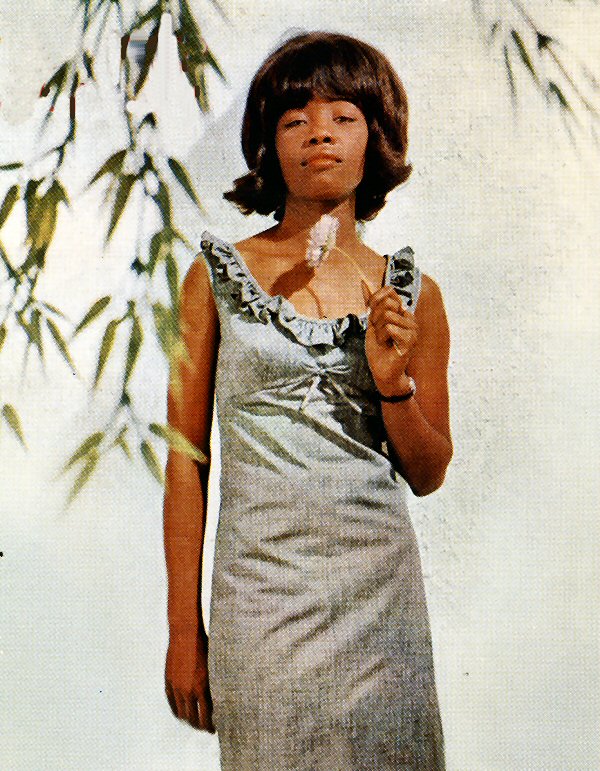 Also in May, 1964, Millicent "Millie" Small entered the charts with "My Boy Lollipop" [Smash 1893], a
remake of a 1956 tune by Barbie Gaye. Small had grown up in Jamaica as the daughter of a sugar
plantation overseer. She had made three singles in Jamaica before moving to England to record her
next single, which was the first single for Chris Blackwell's new Island Records. Blackwell placed the
song on Fontana in England (where she was billed just as "Millie"). When it came time to be released in
the US, it was originally scheduled to be released on Fontana S-1892, but Fontana and Mercury decided
on the more successful Smash label and moved it over to Smash S-1893, cancelling the planned
Fontana single. The song was a huge hit, making #2 in both the US and UK, and reaching #1 in other
countries. When "My Boy Lollipop" hit, Small looked all of about thirteen, and her voice sounded like
she
was eight, although she was almost eighteen at the time. On her subsequent album My Boy
Lollipop [Smash 2/60755], which reached #132, she was billed as "The Blue Beat Girl," referring to a
genre of Jamaican music that was a predecessor to Reggae, one of the mainstays of Island Records
over the years. Her followup single, "Sweet William" [Smash 1920] made #45 here and #30 in the UK.
Two more singles missed the mark here, and she was dropped from the label, although in 1965 she had
another chart record in England with "Bloodshot Eyes" [Fontana TF 617, #48].
Also in May, 1964, Millicent "Millie" Small entered the charts with "My Boy Lollipop" [Smash 1893], a
remake of a 1956 tune by Barbie Gaye. Small had grown up in Jamaica as the daughter of a sugar
plantation overseer. She had made three singles in Jamaica before moving to England to record her
next single, which was the first single for Chris Blackwell's new Island Records. Blackwell placed the
song on Fontana in England (where she was billed just as "Millie"). When it came time to be released in
the US, it was originally scheduled to be released on Fontana S-1892, but Fontana and Mercury decided
on the more successful Smash label and moved it over to Smash S-1893, cancelling the planned
Fontana single. The song was a huge hit, making #2 in both the US and UK, and reaching #1 in other
countries. When "My Boy Lollipop" hit, Small looked all of about thirteen, and her voice sounded like
she
was eight, although she was almost eighteen at the time. On her subsequent album My Boy
Lollipop [Smash 2/60755], which reached #132, she was billed as "The Blue Beat Girl," referring to a
genre of Jamaican music that was a predecessor to Reggae, one of the mainstays of Island Records
over the years. Her followup single, "Sweet William" [Smash 1920] made #45 here and #30 in the UK.
Two more singles missed the mark here, and she was dropped from the label, although in 1965 she had
another chart record in England with "Bloodshot Eyes" [Fontana TF 617, #48].
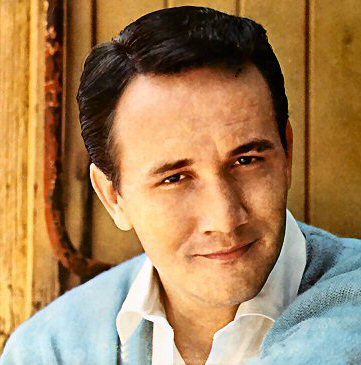 Perhaps the most successful artist ever for Smash made his chart debut in June, 1964. Roger Miller was
the usual "overnight success" that took years of hard work to get to the top. For listeners of top-40
music, he seemed to appear out of nowhere with his zany novelty "Dang Me" [Smash 1881], which
eventually reached #7 pop and #1 country. In fact, he had been recording for RCA Records since the
late 1950s, and had three country chart records for that label including "When Two Worlds Collide" [RCA
Victor 7878], which had reached the country top-10 in 1961. In fact, "Dang Me" wasn't even his first
Smash single. A few months earlier, Smash had released "Less and Less" [Smash 1876] to total listener
and record-buyer apathy. But "Dang Me," with its "bip-bip-bip" vocal gymnastics and
funny-but-all-too-true lyrics was the kind of single that grabbed you by the lapels and demanded you
listen (it won several Grammys). Two more singles followed, both in the same off-the-wall Roger Miller
style: "Chug-A-Lug" [Smash 1926, #9 pop, #3 country], and "Do-Wacka-Do" [Smash 1947, #31 pop, #15
country].
Perhaps the most successful artist ever for Smash made his chart debut in June, 1964. Roger Miller was
the usual "overnight success" that took years of hard work to get to the top. For listeners of top-40
music, he seemed to appear out of nowhere with his zany novelty "Dang Me" [Smash 1881], which
eventually reached #7 pop and #1 country. In fact, he had been recording for RCA Records since the
late 1950s, and had three country chart records for that label including "When Two Worlds Collide" [RCA
Victor 7878], which had reached the country top-10 in 1961. In fact, "Dang Me" wasn't even his first
Smash single. A few months earlier, Smash had released "Less and Less" [Smash 1876] to total listener
and record-buyer apathy. But "Dang Me," with its "bip-bip-bip" vocal gymnastics and
funny-but-all-too-true lyrics was the kind of single that grabbed you by the lapels and demanded you
listen (it won several Grammys). Two more singles followed, both in the same off-the-wall Roger Miller
style: "Chug-A-Lug" [Smash 1926, #9 pop, #3 country], and "Do-Wacka-Do" [Smash 1947, #31 pop, #15
country].
The music business has an old adage: it's not the second single, the one right after a hit, that portends the future, it's the third. In this case, Miller's third single showed some considerable dropoff in popularity, as if the fickle public was tiring of the style. But Miller's fourth single to start the new year (1965) was another blockbuster, in a completely different style, showing Miller's talent was not limited to novelty songs. "King of the Road" [Smash 1965], which reached #4 pop and #1 country, was one of the all-time great sing-along songs. All anyone has to do at a party is start with the opening line, "Trailers for sale or rent, rooms to let, fifty cents..." and people will be singing in no time. This song also won several Grammys and put him on the charts to stay.
Sixteen country chart records on Smash followed, including a hit whose song, "Little Green Apples" [Smash 2146] won another Grammy. After Smash closed down in 1970, Roger Miller kept on keeping on, rolling up eighteen more country charters between late 1970 and 1986 for parent Mercury and other labels. Roger Miller was eventually (1995, three years after his death from cancer) inducted into the Country Music Hall of Fame.
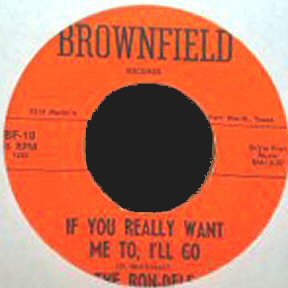 The spring of 1964 had been a fantastically successful time for Smash Records, and throughout the rest
of 1964 and much of 1965, they rode mainly on the hits from Roger Miller, but also followups from Jerry
Lee Lewis and James Brown's band. In late 1964, Smash offered a single by the Walker Brothers, a trio
of Americans who had gone to England to try to break through, but it didn't click. In July of 1965, another
new group, the Ron-Dels, scraped the bottom of the charts at #97 with "If You Really Want Me To, I'll
Go" [Smash 1986], a master acquisition from the Brownfield label. Two more singles failed. The group
probably would not have even been a footnote in history, except one of the two members was Delbert
McClinton, who seems to have been in the music business forever. He was the harmonica player on
"Hey! Baby" and later charted as part of Delbert & Glen in the 1970s, as a solo pop singer in the 1980s,
and as country singer in the 1990s, and has been a guest or studio musician on many other records.
The other Ron-Del (the "Ron"), was Ronnie Kelly. (This Ron-Dels was not the same as the Rondels who
recorded for the Amy label).
The spring of 1964 had been a fantastically successful time for Smash Records, and throughout the rest
of 1964 and much of 1965, they rode mainly on the hits from Roger Miller, but also followups from Jerry
Lee Lewis and James Brown's band. In late 1964, Smash offered a single by the Walker Brothers, a trio
of Americans who had gone to England to try to break through, but it didn't click. In July of 1965, another
new group, the Ron-Dels, scraped the bottom of the charts at #97 with "If You Really Want Me To, I'll
Go" [Smash 1986], a master acquisition from the Brownfield label. Two more singles failed. The group
probably would not have even been a footnote in history, except one of the two members was Delbert
McClinton, who seems to have been in the music business forever. He was the harmonica player on
"Hey! Baby" and later charted as part of Delbert & Glen in the 1970s, as a solo pop singer in the 1980s,
and as country singer in the 1990s, and has been a guest or studio musician on many other records.
The other Ron-Del (the "Ron"), was Ronnie Kelly. (This Ron-Dels was not the same as the Rondels who
recorded for the Amy label).
 Also in the summer of 1965, Smash signed another ex-Sun Records artist, Charlie Rich, whose debut
for Smash, "Mohair Sam" [Smash 1993], reached #21 nationally. Rich had started out as a sax player
while in the military in 1950, and even did some instrumental session work for Sun before recording his
own vocal hit, "Lonely Weekends" for Sun subsidiary Phillips International in 1959 [Phillips International
3552]. Rich had two albums out on Smash. The first one, The Many New Sides of Charlie Rich
featuring Mohair Sam [Smash 2/67070], contained at least one "old side," as he re-recorded his
Phillips International hit, "Lonely Weekends." His followup to "Mohair Sam," "I Can't Go On" [Smash
2012], taken from the album, only reached #132 in December. Rich recorded a second album, The
Best Years [Smash 2/67078], in Nashville in December, 1965, with Ray Stevens arranging. The first
single from the album, "Hawg Jaw" [Smash 2022], made #125 in March, 1966, and the second, "No
Home" [Smash 2038] failed to chart when released a couple of months later. He returned to the studio in
Nashville in August, 1966, to record a subsequent single, "When My Baby Comes Home"/"That's the
Way" [Smash 2060], which also stiffed. That was all for his Smash career. Like other rock and roll
singers who signed with Smash, Rich moved full-time to the country charts when he signed in 1968 with
Epic (and ex-Smash producer Billy Sherrill), starting a long career as the country singing "Silver Fox,"
with 45 chart singles on the country charts between 1968 and 1981, including the #1 pop crossover "The
Most Beautiful Girl" [Epic 11040] in 1973.
Also in the summer of 1965, Smash signed another ex-Sun Records artist, Charlie Rich, whose debut
for Smash, "Mohair Sam" [Smash 1993], reached #21 nationally. Rich had started out as a sax player
while in the military in 1950, and even did some instrumental session work for Sun before recording his
own vocal hit, "Lonely Weekends" for Sun subsidiary Phillips International in 1959 [Phillips International
3552]. Rich had two albums out on Smash. The first one, The Many New Sides of Charlie Rich
featuring Mohair Sam [Smash 2/67070], contained at least one "old side," as he re-recorded his
Phillips International hit, "Lonely Weekends." His followup to "Mohair Sam," "I Can't Go On" [Smash
2012], taken from the album, only reached #132 in December. Rich recorded a second album, The
Best Years [Smash 2/67078], in Nashville in December, 1965, with Ray Stevens arranging. The first
single from the album, "Hawg Jaw" [Smash 2022], made #125 in March, 1966, and the second, "No
Home" [Smash 2038] failed to chart when released a couple of months later. He returned to the studio in
Nashville in August, 1966, to record a subsequent single, "When My Baby Comes Home"/"That's the
Way" [Smash 2060], which also stiffed. That was all for his Smash career. Like other rock and roll
singers who signed with Smash, Rich moved full-time to the country charts when he signed in 1968 with
Epic (and ex-Smash producer Billy Sherrill), starting a long career as the country singing "Silver Fox,"
with 45 chart singles on the country charts between 1968 and 1981, including the #1 pop crossover "The
Most Beautiful Girl" [Epic 11040] in 1973.
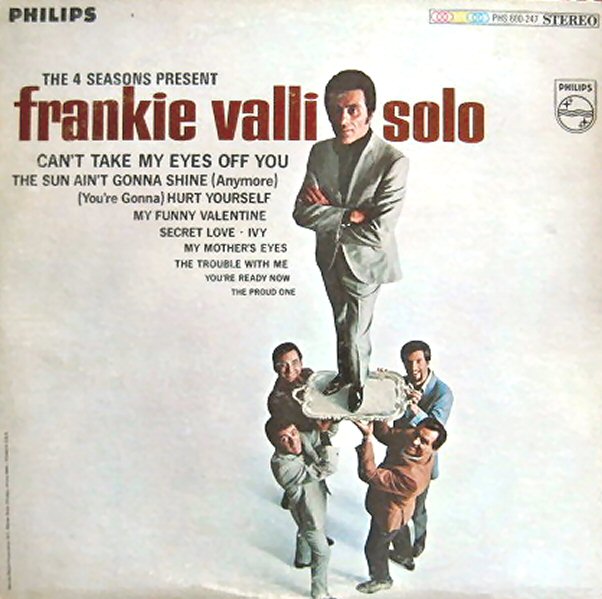 By the fall of 1965, The Four Seasons had put more than 20 singles on the best seller charts, had been
a top-40 fixture since 1962, and their latest, "Let's Hang On" [Philips 40317] was racing up the charts.
Keyboardist/songwriter Bob Gaudio of the group had recently branched out to providing songs for other
groups (see Four-Evers, above), and lead singer Frankie Valli (nee Francis Castelluccio) also
wanted to test the waters as a solo singer. The Seasons at that time were signed to Philips, so Mercury
placed Valli's solo efforts on Smash. Valli's first effort was a great Bob Crewe-Bob Gaudio song, "The
Sun Ain't Gonna Shine (Anymore)" [Smash 1995], but astonishingly, it only reached #128. His second
try, "(You're Gonna) Hurt Yourself" [Smash 2015] did much better, reaching #39, but the third, "You're
Ready Now" [Smash 2037] was back down to a peak of #112. Figuring that Valli's records might be
getting lost on the country-oriented Smash label, Mercury switched his solo efforts back to Philips, where
in May of 1967 he hit #2 with "Can't Take My Eyes Off You" [Philips 40446]. His Smash singles, as well
as the later Philips singles, eventually appeared (in stereo) on a Philips album called The 4 Seasons
Present Frankie Valli Solo [Philips PHS600-247], which has an interesting cover where all four of the
Seasons (including Valli) are holding up a silver platter upon which stands a solo Frankie Valli.
By the fall of 1965, The Four Seasons had put more than 20 singles on the best seller charts, had been
a top-40 fixture since 1962, and their latest, "Let's Hang On" [Philips 40317] was racing up the charts.
Keyboardist/songwriter Bob Gaudio of the group had recently branched out to providing songs for other
groups (see Four-Evers, above), and lead singer Frankie Valli (nee Francis Castelluccio) also
wanted to test the waters as a solo singer. The Seasons at that time were signed to Philips, so Mercury
placed Valli's solo efforts on Smash. Valli's first effort was a great Bob Crewe-Bob Gaudio song, "The
Sun Ain't Gonna Shine (Anymore)" [Smash 1995], but astonishingly, it only reached #128. His second
try, "(You're Gonna) Hurt Yourself" [Smash 2015] did much better, reaching #39, but the third, "You're
Ready Now" [Smash 2037] was back down to a peak of #112. Figuring that Valli's records might be
getting lost on the country-oriented Smash label, Mercury switched his solo efforts back to Philips, where
in May of 1967 he hit #2 with "Can't Take My Eyes Off You" [Philips 40446]. His Smash singles, as well
as the later Philips singles, eventually appeared (in stereo) on a Philips album called The 4 Seasons
Present Frankie Valli Solo [Philips PHS600-247], which has an interesting cover where all four of the
Seasons (including Valli) are holding up a silver platter upon which stands a solo Frankie Valli.
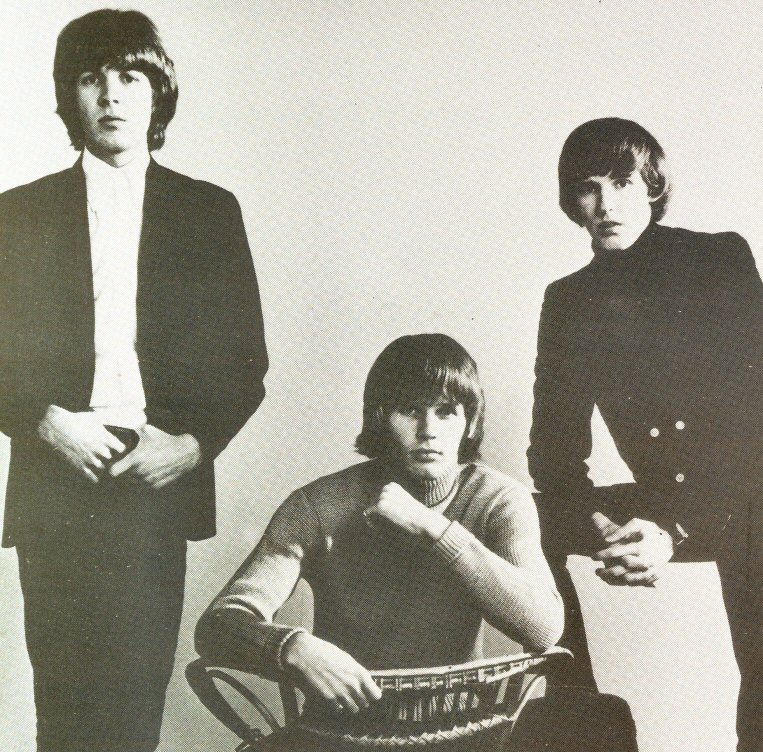 The Walker Brothers were three singers from Los Angeles — Scott Engel, Gary Leeds, and John
Maus — who went by the names Scott Walker, Gary Walker, and John Walker. Their first single
for Smash, "Pretty Girls Everywhere"/"Doin' the Jerk" [Smash 1952] had been released in 1964, but
didn't see much success. Their second single, "Love Her" [Smash 1976], was released to indifference
here, but surprisingly, hit in England, where it reached #20 [Philips BF 1409]. Their third single, released
in the fall of 1965, was a remake of the Jerry Butler tune "Make It Easy on Yourself" [Smash 2000, then
reissued with a different flip as 2009], which reached #1 in England and #16 in the US. The next single,
released in November in England and December here, was "My Ship Is Coming In" [Smash 2016], which
reached #3 in England but only #63 in the US. Then in the spring of 1966 the Brothers reached back for
the song Frankie Valli had tried a few months earlier, "The Sun Ain't Gonna Shine (Anymore)" [Smash
2032], and this time it made #13 (#1 in England). The followup, "(Baby) You Don't Have to Tell Me"
[Smash 2048] made #13 in England, but here, nothing doing. Likewise, "Another Tear Falls" [Smash
2063] in the fall of 1966 made #12 in the UK but missed completely here. Smash finally gave up on
them, although they continued to have chart records in England — ten altogether to only three in
their native United States.
The Walker Brothers were three singers from Los Angeles — Scott Engel, Gary Leeds, and John
Maus — who went by the names Scott Walker, Gary Walker, and John Walker. Their first single
for Smash, "Pretty Girls Everywhere"/"Doin' the Jerk" [Smash 1952] had been released in 1964, but
didn't see much success. Their second single, "Love Her" [Smash 1976], was released to indifference
here, but surprisingly, hit in England, where it reached #20 [Philips BF 1409]. Their third single, released
in the fall of 1965, was a remake of the Jerry Butler tune "Make It Easy on Yourself" [Smash 2000, then
reissued with a different flip as 2009], which reached #1 in England and #16 in the US. The next single,
released in November in England and December here, was "My Ship Is Coming In" [Smash 2016], which
reached #3 in England but only #63 in the US. Then in the spring of 1966 the Brothers reached back for
the song Frankie Valli had tried a few months earlier, "The Sun Ain't Gonna Shine (Anymore)" [Smash
2032], and this time it made #13 (#1 in England). The followup, "(Baby) You Don't Have to Tell Me"
[Smash 2048] made #13 in England, but here, nothing doing. Likewise, "Another Tear Falls" [Smash
2063] in the fall of 1966 made #12 in the UK but missed completely here. Smash finally gave up on
them, although they continued to have chart records in England — ten altogether to only three in
their native United States.
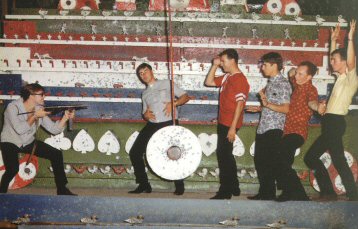 In the spring of 1966, Smash was still on the lookout for buying masters from small labels, and found two
of them. One was "Peter Rabbit" [Smash 2034], an acquisition from the IGL label which reached #45
nationally. The group was Dee Jay and the Runaways from Spirit Lake, Iowa, headed by
bassist/vocalist John Senn (the "Jay") and drummer/vocalist Denny Storey (the "Dee"), with vocalist
Gary Lind, guitarist Bob Godfredson, and keyboardists Tom Vallie and Denny Kintzi. Senn was part
owner of a studio — the Iowa Great Lakes Recording Studio — located in Milford, Iowa,
which he and a couple of friends had started in an old building because it was too far to drive to
Minneapolis to record his group. Senn's band became more-or-less the house band. IGL 100, the
label's first single in 1965, was the group doing "Jenny Jenny" and "Bonie Maronie," pressed up mainly
to test out their new equipment. IGL 103 was "Peter Rabbit." The song sold 5,000 copies locally in three
weeks, attracting the interest of some nine different labels. The group signed a contract with Smash for
six songs, but only four (two singles) were actually done. For their second single, someone knew Dickey
Lee, who went out to Iowa with two of his own songs, "She's a Big Girl Now" and "He's Not Your Friend"
[Smash 2049] which proved to be okay, but somewhat wrong for the group. After the record flopped
completely, Smash dropped the group. Iowa Great Lakes Studio, a decent studio in the middle of
nowhere, became wryly referred to as "The House that Peter Rabbit Built." For aspiring Iowa rockers,
they offered a three-hour recording session and one thousand 45rpm singles on either the IGL label or
the sister Sonic label, all for $345.
In the spring of 1966, Smash was still on the lookout for buying masters from small labels, and found two
of them. One was "Peter Rabbit" [Smash 2034], an acquisition from the IGL label which reached #45
nationally. The group was Dee Jay and the Runaways from Spirit Lake, Iowa, headed by
bassist/vocalist John Senn (the "Jay") and drummer/vocalist Denny Storey (the "Dee"), with vocalist
Gary Lind, guitarist Bob Godfredson, and keyboardists Tom Vallie and Denny Kintzi. Senn was part
owner of a studio — the Iowa Great Lakes Recording Studio — located in Milford, Iowa,
which he and a couple of friends had started in an old building because it was too far to drive to
Minneapolis to record his group. Senn's band became more-or-less the house band. IGL 100, the
label's first single in 1965, was the group doing "Jenny Jenny" and "Bonie Maronie," pressed up mainly
to test out their new equipment. IGL 103 was "Peter Rabbit." The song sold 5,000 copies locally in three
weeks, attracting the interest of some nine different labels. The group signed a contract with Smash for
six songs, but only four (two singles) were actually done. For their second single, someone knew Dickey
Lee, who went out to Iowa with two of his own songs, "She's a Big Girl Now" and "He's Not Your Friend"
[Smash 2049] which proved to be okay, but somewhat wrong for the group. After the record flopped
completely, Smash dropped the group. Iowa Great Lakes Studio, a decent studio in the middle of
nowhere, became wryly referred to as "The House that Peter Rabbit Built." For aspiring Iowa rockers,
they offered a three-hour recording session and one thousand 45rpm singles on either the IGL label or
the sister Sonic label, all for $345.
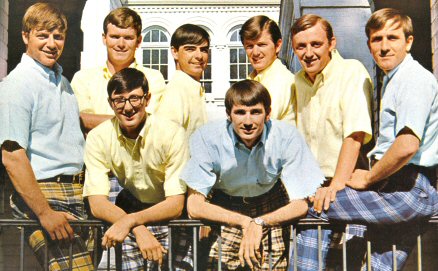 The other master acquisition in the spring of 1966 was "Double Shot (Of My Baby's Love)" by the
Swingin' Medallions, a quintessential frat party song, which they obtained from the 4 Sale label [4 Sale
6230]. The Swingin' Medallions were based in Greenwood, South Carolina, and proved to be quite
popular with the Myrtle Beach "Beach Music" scene. The group was made up of vocalist John McElrath,
guitarist Jimbo Dores, keyboardist Brent Fortson, bassist Jim Perkins, drummer Joe Morris, and a horn
section of Carroll Bledsoe, Charlie Webber, and Steven Caldwell. The song reached #17 nationally
when reissued on Smash 2033, and would have climbed higher had not the record's lyrics run into a
snag.
The other master acquisition in the spring of 1966 was "Double Shot (Of My Baby's Love)" by the
Swingin' Medallions, a quintessential frat party song, which they obtained from the 4 Sale label [4 Sale
6230]. The Swingin' Medallions were based in Greenwood, South Carolina, and proved to be quite
popular with the Myrtle Beach "Beach Music" scene. The group was made up of vocalist John McElrath,
guitarist Jimbo Dores, keyboardist Brent Fortson, bassist Jim Perkins, drummer Joe Morris, and a horn
section of Carroll Bledsoe, Charlie Webber, and Steven Caldwell. The song reached #17 nationally
when reissued on Smash 2033, and would have climbed higher had not the record's lyrics run into a
snag.
The 1966-1967 period was an odd one for top-40, where certain program directors refused to play some records they considered "offensive" to their listeners. The Mauds' remake of Sam & Dave's "Hold On, I'm Comin'" had to be changed to "Hold on, don't you worry, hold on, please." Lou Christie's "Rhapsody in the Rain" had to have lyrics changed for airplay. The lyrics in question for "Double Shot" apparently included the word "hangover" in the opening verse, "Woke up this morning I was feelin' so bad, the worst hangover I ever had." Likewise, the lines, "She loved me so long and she loved me so hard, I finally passed out in her front yard" were deemed objectionable (as I said, the quintessential 1960s frat party song...). Some stations, notably Chicago giant WLS, flatly refused to play the song. Smash had the singer re-record some lyrics ("the worst morning after I ever had"; ""she kissed me so long and she kissed me so hard"), and rather crudely spliced them into the song and offered the new version to the radio stations, but by that time it was too late. So ultimately, the record didn't have full radio exposure in some huge markets. The edited version of the song actually showed up on some versions of their album. Their followup, "She Drives Me Out of My Mind" [Smash 2050] only reached #71. Fortson and Caldwell later recorded for A&M as the Pieces of Eight, where they had a minor hit in the summer of 1967 with a remake of the O'Jays "Lonely Drifter" [A&M 854, #59].
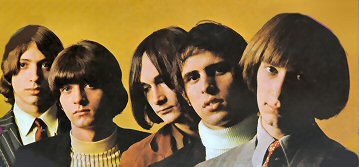 The Left Banke was a quintet from Brooklyn whose approach to pop music was something like "Bach
meets rock and roll." Harpsichords, oboes, violins, and a baroque classical music sound applied to
rock'n'roll yielded their first hit, "Walk Away Renee" [Smash 2041], which entered the charts in
September, 1966, and finally topped out at #5. The followup was an ethereal, dream-like story, "Pretty
Ballerina" [Smash 2074], which reached #15 in early 1967. An album was issued, uncreatively titled
Walk Away Renee/Pretty Ballerina [Smash 2/67088], which reached #67 on the charts. The
group included Steve Martin (vocals), Michael Brown (born Michael Lookofsky, keyboards, whose father,
Harry, managed the group), Rick Brand (guitar), Tom Finn (bass), and George Cameron (drums). The
"Renee" of the hit song was Tom Finn's girlfriend Renee Fladen, and the group also wrote "Pretty
Ballerina"and "She May Call You Up Tonight" about her. After "Pretty Ballerina" hit, the group fell apart
somewhat. Michael Brown refused to tour, and put together a new bunch of musicians for their third
single, "Ivy, Ivy" [Smash 2089], which only reached #119 (although the flip, "And Suddenly" was later a
hit for the Cherry People). Smash, seeing that the new lineup didn't have the same impact as the hit
group, abandoned promotion on "Ivy, Ivy" and quickly issued a track from the album, "She May Call You
Up Tonight" [Smash 2097], which also only reached #120. The original members got back together to
work on new songs, but by the time the next single, "Desireé" [Smash 2119] came out in
October, 1967, the group was again in disarray. Brown and Brand quit, leaving Martin, Cameron, and
Finn to carry on as a trio. An unsuccessful album followed, The Left Banke, Too [Smash SRS
67113], and that was it for the group. Mike Brown went on to join the band Stories, who had several
hits in the 1970s.
The Left Banke was a quintet from Brooklyn whose approach to pop music was something like "Bach
meets rock and roll." Harpsichords, oboes, violins, and a baroque classical music sound applied to
rock'n'roll yielded their first hit, "Walk Away Renee" [Smash 2041], which entered the charts in
September, 1966, and finally topped out at #5. The followup was an ethereal, dream-like story, "Pretty
Ballerina" [Smash 2074], which reached #15 in early 1967. An album was issued, uncreatively titled
Walk Away Renee/Pretty Ballerina [Smash 2/67088], which reached #67 on the charts. The
group included Steve Martin (vocals), Michael Brown (born Michael Lookofsky, keyboards, whose father,
Harry, managed the group), Rick Brand (guitar), Tom Finn (bass), and George Cameron (drums). The
"Renee" of the hit song was Tom Finn's girlfriend Renee Fladen, and the group also wrote "Pretty
Ballerina"and "She May Call You Up Tonight" about her. After "Pretty Ballerina" hit, the group fell apart
somewhat. Michael Brown refused to tour, and put together a new bunch of musicians for their third
single, "Ivy, Ivy" [Smash 2089], which only reached #119 (although the flip, "And Suddenly" was later a
hit for the Cherry People). Smash, seeing that the new lineup didn't have the same impact as the hit
group, abandoned promotion on "Ivy, Ivy" and quickly issued a track from the album, "She May Call You
Up Tonight" [Smash 2097], which also only reached #120. The original members got back together to
work on new songs, but by the time the next single, "Desireé" [Smash 2119] came out in
October, 1967, the group was again in disarray. Brown and Brand quit, leaving Martin, Cameron, and
Finn to carry on as a trio. An unsuccessful album followed, The Left Banke, Too [Smash SRS
67113], and that was it for the group. Mike Brown went on to join the band Stories, who had several
hits in the 1970s.
In September, 1966, a young group of brothers from Ohio went into the studio to record a song off the Troggs first album. Not particularly unusual, but the age of the brothers was unusual: 13, 11, and 6. "Hi Hi Hazel" by Gary and the Hornets (Gregg, Gary, and Steve Calvert, from oldest to youngest) [Smash 2061] barely scraped the bottom of the top-100 nationally at #96, and their followup singles fared worse. But the group was a forerunner of more successful groups in the future with very young members.
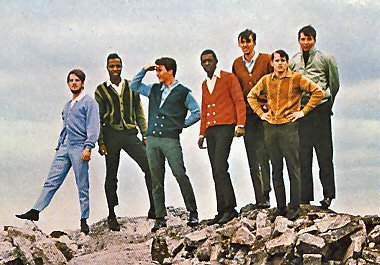 For the rest of 1966 and most of 1967, Smash didn't have any new artists that made the charts. It wasn't
until the summer of 1967 that a new group, Jay and the Techniques, made any chart noise. The group,
from Allentown, Pennsylvania, was Jay Proctor, Karl Landis, Ronnie Goosly, John Walsh, George
Lloyd, Chuck Crowl, and Dante Dancho. Their first single, "Apples, Peaches, Pumpkin Pie" [Smash
2086] provided a great opportunity for promoters to make a splash by bringing the aforesaid foods down
to local disc jockeys while they were on the air (disc jockeys were always happy to see free food). Not to
say that had anything to do with the popularity of the song, but it reached #6 nationally. The followup,
"Keep the Ball Rollin'" [Smash 2124] made #14 in the fall. Back with the food theme, the next single,
"Strawberry Shortcake" [Smash 2142] made #39 to start off 1968, followed by "Baby, Make Your Own
Sweet Music" [Smash 2154, #64]. Two subsequent singles didn't crack the top-100.
For the rest of 1966 and most of 1967, Smash didn't have any new artists that made the charts. It wasn't
until the summer of 1967 that a new group, Jay and the Techniques, made any chart noise. The group,
from Allentown, Pennsylvania, was Jay Proctor, Karl Landis, Ronnie Goosly, John Walsh, George
Lloyd, Chuck Crowl, and Dante Dancho. Their first single, "Apples, Peaches, Pumpkin Pie" [Smash
2086] provided a great opportunity for promoters to make a splash by bringing the aforesaid foods down
to local disc jockeys while they were on the air (disc jockeys were always happy to see free food). Not to
say that had anything to do with the popularity of the song, but it reached #6 nationally. The followup,
"Keep the Ball Rollin'" [Smash 2124] made #14 in the fall. Back with the food theme, the next single,
"Strawberry Shortcake" [Smash 2142] made #39 to start off 1968, followed by "Baby, Make Your Own
Sweet Music" [Smash 2154, #64]. Two subsequent singles didn't crack the top-100.
 Another interesting single from the summer of 1967 was a local hit by WCFL-Chicago disc jockey
Barney Pip, who recorded "You Turn Me On" (a remake of the Ian Whitcomb tune of two years earlier)
[Smash 2102], which Pip sang backed by a popular Chicago rock group, the Rovin' Kind. This was part
of a brief trend at the time, as fellow WCFL jock Jerry G. Bishop had recorded "She's Gone" while he
was still in Cleveland and it was played on WCFL when he joined the station. WCFL in the summer of
1967 was one of the most interesting stations ever, with Dick Orkin doing "Chicken Man" every day and
a cast of wild men trying almost anything to get an audience. When WCFL had switched to the top-40
format in 1965, the program director for the established Chicago top-40 giant WLS had opined to a
newspaper reporter that, "comparing WCFL to WLS is like comparing a flea to an elephant." This quote
was written in large letters and pasted above the studio window between the jock and the engineer so
that the jock would be looking at it all the time. A ratings war ensued, much to the delight of listeners,
and eventually – at least for a while – WCFL prevailed.
Another interesting single from the summer of 1967 was a local hit by WCFL-Chicago disc jockey
Barney Pip, who recorded "You Turn Me On" (a remake of the Ian Whitcomb tune of two years earlier)
[Smash 2102], which Pip sang backed by a popular Chicago rock group, the Rovin' Kind. This was part
of a brief trend at the time, as fellow WCFL jock Jerry G. Bishop had recorded "She's Gone" while he
was still in Cleveland and it was played on WCFL when he joined the station. WCFL in the summer of
1967 was one of the most interesting stations ever, with Dick Orkin doing "Chicken Man" every day and
a cast of wild men trying almost anything to get an audience. When WCFL had switched to the top-40
format in 1965, the program director for the established Chicago top-40 giant WLS had opined to a
newspaper reporter that, "comparing WCFL to WLS is like comparing a flea to an elephant." This quote
was written in large letters and pasted above the studio window between the jock and the engineer so
that the jock would be looking at it all the time. A ratings war ensued, much to the delight of listeners,
and eventually – at least for a while – WCFL prevailed.
The only other new artist to chart for Smash between 1967 and the time they were disbanded in late spring, 1970, was Doug Sahm's Sir Douglas Quintet, who charted with "Medocino" [Smash 2191], which reached #27 in early 1969. The song was notable as being one of the first hits to use the term "teenybopper." Other than that, Smash existed from 1967 to 1970 primarily on the hits of Roger Miller and Jerry Lee Lewis. After Mercury became part of PolyGram in the 1980s, Smash was revived for a short time as a country label, but this didn't last long. Smash will mostly be remembered for the wide variety of 1960s hits during the time when Shelby Singleton was at the helm.
We would appreciate any additions or corrections to this discography. Just send them to us via e-mail. Both Sides Now Publications is an information web page. We are not a catalog, nor can we provide the records listed below. We have no association with Smash Records or Mercury Records. Should you be interested in acquiring albums listed in this discography (which are all out of print), we suggest you see our Frequently Asked Questions page and Follow the instructions found there. This story and discography are copyright 2008 by Mike Callahan.
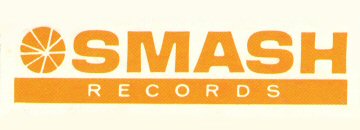 The Smash Records Story
The Smash Records Story Back to the Discography Listings Page
Back to the Discography Listings Page